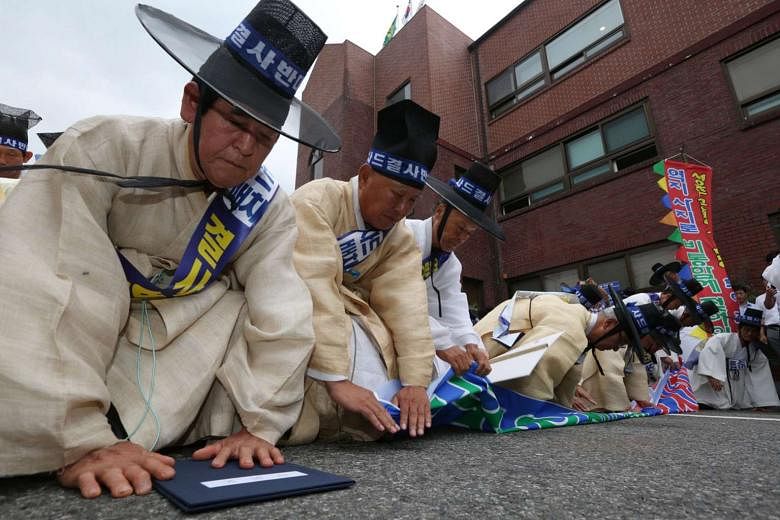South Korean President Park Geun Hye has made an emotional appeal for public support for the government's decision to deploy an advanced US anti-missile shield in the melon-farming county of Seongju.
In the latest in a series of statements to defend the deployment of the Terminal High Altitude Area Defence (Thaad) system, Ms Park evoked personal memories of how she lost her parents due to two assassination attempts in the 1970s.
"I have lost my parents in the most excruciatingly painful way. My only remaining calling as President now is to safeguard the country and people from various threats," she said during a Cabinet meeting yesterday.
She added that the deployment was an "irreversible" decision even as she tried to assuage concerns over possible health and environmental risks.
Analysts say her remarks are the latest sign that Seoul is resolutely pushing ahead with the plan despite on-going protests. She had previously said the move was "inevitable" because of a growing missile threat from North Korea.
Dr Bong Young Shik, visiting research fellow at The Asan Institute of Public Policy think-tank, said Ms Park appears to be taking a dual-track approach of maintaining a strong stance against criticism while trying to engage Seongju residents and soothe public sentiment.
"The decision is not going to change. The government will push ahead with the deployment as scheduled," he said.
A Defence Ministry spokesman told The Straits Times the deployment is planned for late next year.
He said the decision is firm, but could be retracted if North Korea were to give up its nuclear arms, a move that seems unlikely for now.
In her speech yesterday, Ms Park said she will meet local leaders to address public concerns and issues.
"The decision to deploy Thaad was made after a long and painstakingly thorough review. I would never have made the decision if Thaad poses the slightest risk to the lives of the local residents," she said.
Since news broke on July 13 that the system will be sited in Seongju, in the eastern province of North Gyeongsang, local residents have been holding daily protests against it. They are worried that the strong electromagnetic waves emitted by Thaad's powerful radar will pose health and environmental threats.
Ms Park dismissed the concerns yesterday, saying that the government had made many site visits to ensure there are no safety issues. She warned the people against listening to "strange and groundless rumours rather than scientific evidence" about the deployment.
Seongju was chosen for its relatively low population of 45,000 and strategic location. If deployed there, Thaad can also protect key US military facilities in the nearby cities of Daegu and Pyeongtaek.
But the move has sparked a fierce backlash from what is traditionally the support base of her conservative Saenuri Party.
Critics including opposition parties have also lambasted it, saying it would aggravate tension between the two Koreas and alienate China.
China's Xinhua news agency, in a commentary yesterday, again warned Seoul to "tread carefully" as its Thaad decision had "jeopardised" relations. China's main fear is that Thaad's radar range of 1,900km will allow the US to spy on almost half of China's territory.

